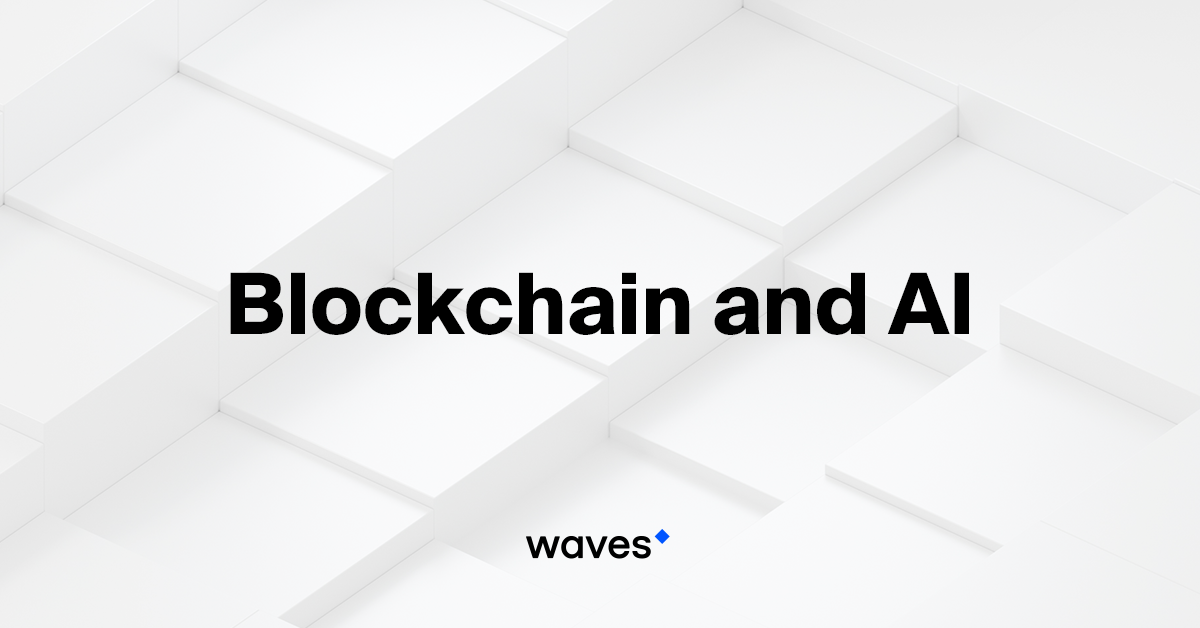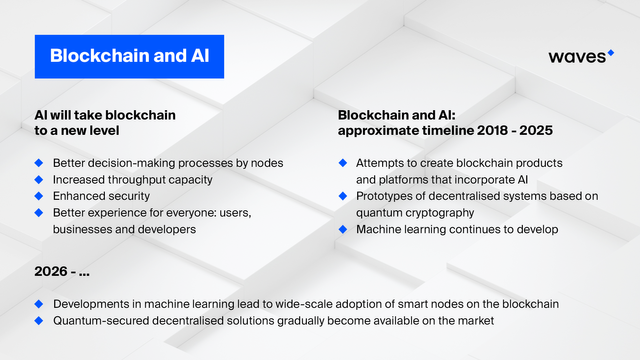Blockchain and AI

Alongside IoT, e-commerce and quantum computing, blockchain and AI are at the top of the list of most talked about topics in tech today. Two things are obvious:
— All five are already changing the world, bringing all kinds of futuristic ideas to reality
— A bright future means multi-level diffusion of these phenomena
We are witnessing the coming of a new technological era. (Don’t confuse this with the ‘Singularity’ — something that might not be as cool as many believe and predict.) But much of this new era depends on details that are often ignored, not only by futurists but scientists and entrepreneurs too.
The exact type of future into which we’re heading is bound up with the evolution of all of the trends involved. Of the five (IoT, e-commerce, quantum computing, AI and blockchain) the situation with AI is the least clear, even compared to blockchain. AI and blockchain both became big news some years ago. Both are shaping the future, whilst influencing one another, but we still have to consider a major difference between them: how long each technology has existed.
Blockchain has already gone through several preparatory stages, each resulting in major leaps forward and giving the technology a launch pad for success. It took time for the necessary conditions for blockchain’s development to emerge. The ongoing blockchain debate is focused mainly on the following issues:
- Ease of use
- Security
- Throughput capacity
So, unlike AI, blockchain is more banal and practical. It is already a ready-made, well-functioning instrument.
With AI, the situation is different. Yes, AI is much older — first experiments with “smart machines” started back in the 1950s. Since then AI has seen both progress and crisis. Today, it is far from where many expected it to be. The thing is that AI is a much more uncertain issue, compared to other technologies, since it brings about a whole spectrum of other questions concerning not only technical aspects but ethics, anthropology, etc. The list is long and keeps expanding alongside AI’s evolution. If we talk about ethics, for example, the main questions have always been the following:
- Is it OK to create a human-like entity in digital/machine form?
- Will this smart machine have feelings and/or selfhood? How should we treat it if so?
- What if the machines rise up and wipe out humanity?
- Can machines be smart and helpful, but not have free will?
All these questions mean one thing: humanity is not ready for human-like AI and definitely won’t be ready from the long-term perspective. Facebook’s AI has freaked everyone out, such as when the company reported that their AI entities have come up with their own artificial language. The same happened with Sophia, who said she wanted to destroy humanity (but took her words back afterwards). Are these cases a marketing trick to boost interest in both companies? Or is there a classical sci-fi scenario involved, where the creation wants to harm its creator? Neither explanation is clear, but the two possibilities mean that AI is not a functioning, fit-for-purpose technology just yet. The camp of dreamers is winning over serious scientists and developers. These guys want to skip the essential steps necessary for AI to really start impacting our lives. Any tech in which a human can see their reflection and exercise their God complex is destined to evolve slowly and/or harmfully. Scientists are people too, and most people would subconsciously love to have someone by their side who can act and be like a human, but without the emotional and ethical consequences otherwise entailed. If you harm a machine, it will still remain a machine — many people have enjoyed playing with that idea, but that is not what we should seek in the development of AI. Instead of pursuing an AI with a selfhood and human-like free will, we should focus on machine learning backed by quantum computing.

Unfortunately, there is no consensus on what we want from AI, which is why the technology develops so slowly. Ironically, the scientific community does admit that the subdivisions of the study of AI haven’t been good at communicating with each other, starting right back from the official academic recognition of AI as a discipline in 1956.
In such a situation it would be wise to ask humanity one question: do we really need a human in a form of a machine? Putting the God complex and irrational curiosity aside, humans would generally answer that we don’t need human-like machines to bring about a bright future for humanity. Natural selection means inevitable change and development, with constant competition within and between species. New human-like intelligent species will make the situation even worse. Humans don’t need that. What they need are smart machines that will serve them well. In order for a solid blockchain-AI-IoT-e-commerce alliance to become a reality, scientists and developers need to remain scientists first and foremost.
Let’s consider a realistic combination of AI and blockchain — one that would be profitable, and not harmful to humans. How can AI be of use for blockchain? First of all, both technologies have something very important in common. AI and blockchain are able to significantly increase any system’s throughput capacity. Unlike any centralized system, functioning with the help of intermediaries (servers, for examples), blockchain is based on decentralization: verification of all actions happens on the spot, whilst providing a high degree of security and speed.
The number of devices, transactions and e-commerce activities will increase dramatically over the coming five years. Blockchain will need a good ally, because even now blockchain systems, despite being better than centralized ones, are already encountering problems with capacity throughput and security. Artificial intelligence with a focus on machine learning is a perfect match for the blockchain. If nodes are really smart they’ll be capable of making clever security decisions, since they often come under attack. Moreover, smart nodes not only are good for IoT but any use case, including healthcare, supply management, gaming, governance, etc.
Many critics believe that when quantum computing finally comes onto the scene, it will crush blockchain technology (even now, if used by hackers, it would cause billions of dollars of losses in the crypto world). But conversely, AI and quantum computing can be used to create more secure and swift blockchain systems (a prototype of such a system was tested in Moscow in 2017).
The short-term perspective is clear: blockchain will incorporate AI, for security decision-making purposes mostly, whilst gradually making attempts to include quantum cryptography in its structure. There’s still a long road ahead, but that is the most realistic prognosis for an AI-and-blockchain merger. That’s also a good thing for the rapidly growing IoT and e-commerce sectors:
- There will be more than $20 billion of IoT units on Earth in 2020, compared to the $11 billion we have today
- Global online retail sales will reach $1.915 trillion this year and rise to $4.058 trillion in 2020.
These trends mean a significant rise in the amount of information and transactions that will need to be smoothly and rapidly processed and secured, so blockchain, AI and quantum computing combined will be of much help.
Join Waves Community
Read Waves News channel
Follow Waves Twitter
Subscribe to Waves Facebook
korean translate Ver.
불럭체인과 AI
https://steemit.com/coinkorea/@coolzero/ai-18-05-20
It will be very cool if the WAVES will develop in this direction
Мне кажется не вооруженным глазом видно что waves двигаются в этом направление, а с другой стороны наверно глупо являясь топовой технологичной компанией не брать на вооружение то что уже сегодня внедряется в окружающий мир...
A GANG OF THIEVES !
Leave the Google form open after 1000 participants to get the maximum BTC that can not be recovered due to the exorbitant price of transfer fees and take more transfert fees in Waves.
Sneaky Ninja Attack! You have just been defended with a 93.72% upvote!
I was summoned by @wavesplatform. I have done their bidding and now I will vanish...
woosh
A portion of the proceeds from your bid was used in support of youarehope and tarc.
Abuse Policy
Rules
How to use Sneaky Ninja
How it works
Victim of grumpycat?
Both are shaping the future, whilst influencing one another.
Artificial intelligence with blockchain is capable of making clever security decisions and can be used in healthcare, supply management, gaming, governance, etc.